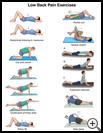
Low Back Pain Exercises
- Abdominal drawing-in maneuver: Lie on your back with your knees bent and your feet flat on the floor. Try to pull your belly button in towards your spine. Hold this position for 15 seconds and then relax. Repeat 5 to 10 times.
- Cat and camel: Get down on your hands and knees. Let your stomach sag, allowing your back to curve downward. Hold this position for 5 seconds. Then arch your back and hold for 5 seconds. Do 2 sets of 15.
- Quadruped arm and leg raise: Get down on your hands and knees. Pull in your belly button and tighten your abdominal muscles to stiffen your spine. While keeping your abdominals tight, raise one arm and the opposite leg away from you. Hold this position for 5 seconds. Lower your arm and leg slowly and change sides. Do this 10 times on each side.
- Pelvic tilt: Lie on your back with your knees bent and your feet flat on the floor. Pull your belly button in towards your spine and push your lower back into the floor, flattening your back. Hold this position for 15 seconds, then relax. Repeat 5 to 10 times.
- Partial curl: Lie on your back with your knees bent and your feet flat on the floor. Draw in your abdomen and tighten your stomach muscles. With your hands stretched out in front of you, curl your upper body forward until your shoulders clear the floor. Hold this position for 3 seconds. Don't hold your breath. It helps to breathe out as you lift your shoulders. Relax back to the floor. Repeat 10 times. Build to 2 sets of 15. To challenge yourself, clasp your hands behind your head and keep your elbows out to your sides.
- Gluteal stretch: Lie on your back with both knees bent. Rest your right ankle over the knee of your left leg. Grasp the thigh of the left leg and pull toward your chest. You will feel a stretch along the buttocks and possibly along the outside of your hip. Hold the stretch for 15 to 30 seconds. Then repeat the exercise with your left ankle over your right knee. Do the exercise 3 times with each leg.
- Extension exercise
- Lie face down on the floor for 5 minutes. If this hurts too much, lie face down with a pillow under your stomach. This should relieve your leg or back pain. When you can lie on your stomach for 5 minutes without a pillow, you can continue with Part B of this exercise.
- After lying on your stomach for 5 minutes, prop yourself up on your elbows for another 5 minutes. If you can do this without having more leg or buttock pain, you can start doing part C of this exercise.
- Lie on your stomach with your hands under your shoulders. Then press down on your hands and extend your elbows while keeping your hips flat on the floor. Hold for 1 second and lower yourself to the floor. Do 3 to 5 sets of 10 repetitions. Rest for 1 minute between sets. You should have no pain in your legs when you do this, but it is normal to feel some pain in your lower back.
Do this exercise several times a day.
- Side plank: Lie on your side with your legs, hips, and shoulders in a straight line. Prop yourself up onto your forearm with your elbow directly under your shoulder. Lift your hips off the floor and balance on your forearm and the outside of your foot. Try to hold this position for 15 seconds and then slowly lower your hip to the ground. Switch sides and repeat. Work up to holding for 1 minute. This exercise can be made easier by starting with your knees and hips flexed toward your chest.
- Prone plank: Lie on your stomach on the floor with your elbows bent and your forearms resting on the floor. Lift your hips and knees off the floor and try to stay in this position while keeping your back flat. Work up to holding this position for at least 1 minute. Do 3 sets.
Developed by Change Healthcare.
Pediatric Advisor 2018.1 published by Change Healthcare.
Last modified: 2016-05-26
Last reviewed: 2016-05-18
Last modified: 2016-05-26
Last reviewed: 2016-05-18
This content is reviewed periodically and is subject to change as new health information becomes available. The information is intended to inform and educate and is not a replacement for medical evaluation, advice, diagnosis or treatment by a healthcare professional.
© 2018 Change Healthcare LLC and/or one of its subsidiaries

